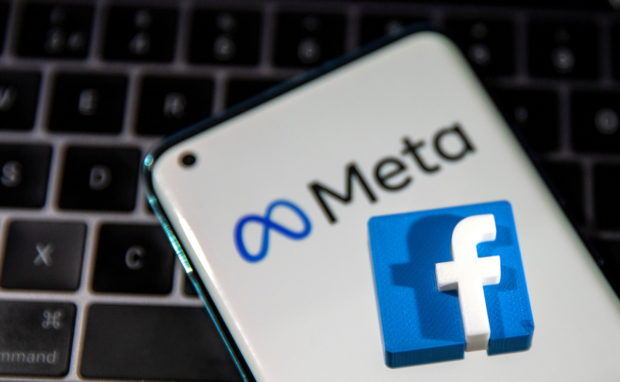Over 24M fake content on COVID-19, vaccines removed by Meta from platforms

FILE PHOTO: A smartphone with Meta logo and a 3D printed Facebook logo is placed on a laptop keyboard in this illustration taken October 28, 2021. REUTERS/Dado Ruvic/Illustration/File Photo
MANILA, Philippines — Meta, the company that oversees social media sites like Facebook and Instagram, has removed over 24 million fake content relating to the COVID-19 pandemic and the vaccines, its Misinformation Policy lead in the Asia Pacific region said.
In a briefing on Thursday, Alice Budisatrijo of Meta’s Product Policy team said that aside from that, 195 million pieces of content for COVID-19 misinformation have been labeled already, with the help of fact-checkers around the world.
“So this is the progress that we’ve made, since the beginning of the pandemic, we have removed some 24 million pieces of false content about COVID-19 and the vaccines, and we have labeled more than 195 million pieces of content for the COVID-19 misinformation,” Budisatrijo told Manila-based reporters.
“This is of course through our partnership with fact-checking partners over the world, and we have connected more than two billion people from 189 countries with reliable health information via the COVID-19 information center and news feed pop-outs,” she added.
In handouts provided by Meta to reporters, the company detailed how it constantly updated its mechanisms to reduce misinformation particularly regarding COVID-19 over their platforms.
Article continues after this advertisementIn February 2021, Meta expanded their policies to remove more false claims about COVID-19 vaccines; by mid-year, it started removing pages, groups, and accounts that discouraged vaccinations.
Article continues after this advertisementThen in June of 2021, a new technology that can detect deepfakes — or videos of well-known personalities that are artificially created, meaning these are not authentic footage of people — was launched to prevent misinformation.
“The second pillar in our strategy is to reduce […] the first thing that we reduced is content that has been rated by our fact-checkers. So while the content is still on platform, very few people will see it, but we’ve also launched these updates, we reduced the reach of rule-breaking members in groups,” Budisatrijo said.
“So everything that they post will be seen by fewer people. We reduced the distribution of all posts from people who violated our COVID-19 vaccine misinformation policies, and we reduced the distribution of all posts from accounts, as well as pages and groups, that repeatedly shared fact-checked content,” she added.
Misinformation about COVID-19 and the vaccines have been a huge problem for the Department of Health and the national government, as even some medical practitioners have claimed that the pandemic is nothing but an ordinary disease.
There are also some that have insisted that vaccines are dangerous, despite it being certified safe by health experts.
READ:
DOH condemns health experts spreading false information about COVID-19 jabs
Pope Francis backs COVID vaccination drives, warns of ideological misinformation
However, outlooks about vaccinations are looking positive recently: while it is unclear if there is a correlation between Meta’s measures towards misinformation regarding COVID-19 and vaccine statistics in the Philippines, a recent Social Weather Stations (SWS) survey revealed that less Filipinos are wary of COVID-19 vaccines compared to the past few months.
According to the survey taken last December 2021, only eight percent of the respondents expressed skepticism towards the vaccines, compared to 18 percent in September 2021.
SWS also found out that only six percent have admitted being uncertain about getting vaccinated, compared to the 19 percent in September 21; 24 percent in June 2021; and 35 percent in May 2021.
Also, the number of people who got vaccinated increased from SWS’ past surveys.
As of Monday, health authorities in the country said that at least 57.2 million individuals in the country are fully vaccinated, which is 73.33 percent of the government’s target population for herd immunity.
Also, 6.2 million fully-vaccinated individuals have already gotten their booster shots.